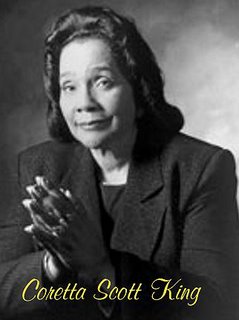
Long active in the fight for civil and human rights, Coretta Scott King had become an international icon for her efforts to promote nonviolent social change.The second of three children of Obadiah and Bernice (McMurry) Scott, King grew up in rural Alabama, where she helped her family harvest cotton and tend to their farm. Her father hauled lumber for a white sawmill owner, a job that enabled him to purchase and operate his own sawmill. The local white community resented her father's success: vandals allegedly burned his sawmill, and the Scotts' house, to the ground. King was deeply shaken by her family's trials. She dreamed of moving to the North and diligently focused on her education, enrolling in a local private high school, where she pursued her talent for music.
In 1945 she won a scholarship to Antioch College in Yellow Springs, Ohio. She studied music and elementary education, and in 1948 debuted as a vocalist at the Second Baptist Church. Also while at Antioch, she performed in a program with Paul Robeson, renowned African American singer and civil rights activist, who encouraged her to pursue advanced musical training.In 1951, aspiring to become a classical singer, King entered the New England Conservatory of Music in Boston on a scholarship. She struggled to support herself, living and working at a Beacon Hill boardinghouse. In 1953 she married Martin Luther King Jr., then a doctoral student in theology at Boston University. Her marriage to King was a pivotal point in her life: upon graduating from the conservatory, she returned with him to Montgomery, Alabama, where he worked as a pastor at Dexter Avenue Baptist Church.
During the following years, she reared their four children and stood by her husband at the forefront of the Civil Rights Movement. In 1962, following the King family's move to Atlanta, she taught voice lessons at Morris Brown College while continuing her civil rights work. Steadfastly loyal to her husband, she joined him in civil rights demonstrations throughout the South, led marches, spoke at rallies, and organized fundraising events at which she lectured and performed as a vocalist.
After the assassination of her husband in 1968, King continued to lead major demonstrations in support of striking workers and the poor, and organized marches to promote Dr. King's principles, such as the 20th anniversary March on Washington in 1983. In 1969, as a memorial to Dr. King, she founded the Atlanta-based Martin Luther King Jr. Center for Nonviolent Social Change, a center principally devoted to training people, especially students, in nonviolent social protest. Serving as the center's president and chief executive officer, she has maintained a high public profile in the U.S. and abroad, and has traveled through southern Africa to protest apartheid. In 1986 she prevailed in her campaign to establish a national holiday honoring Dr. King.
Since then, she had continued to campaign worldwide for human rights, social justice, and urban renewal programs for disadvantaged communities.
May God rest her beautiful soul as she joins her loving husband in heaven. May God send us more leaders like her. She shall be missed.
Comments
~Deb
Perhaps the need for her particular message has diminshed with the civil rights movement.There are alot of strong black role models now too though. Mostly in the entertainment business. As long as we are open to hearing them there are voices to listen to. I think it is a choice now really. We chose to listen to different messages.